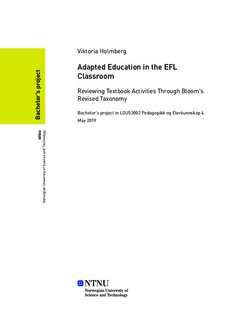Abstract
In the Norwegian Education Act, it is stated that “education shall be adapted to the pupils’ abilities and assumptions” (Opplæringsloven, 1998, § 1-3, my translation). Håstein & Werner (2014) claim that the actual subject can be a source for adapted teaching, provided that the teaching instructions are varied. Seeing how several studies have shown that Norwegian English as a foreign language (EFL) teachers rely heavily on textbooks, knowledge about what these resources can provide in terms of variety is arguably essential. As long as EFL teachers familiarise themselves with the particular strengths and weaknesses of a given book, the textbook should be regarded as a useful supplement in catering for adapted education. As an attempt to provide a constructive view on EFL textbooks, this thesis reviews interactive speaking activities (ISAs) in the three textbooks Stages (Areklett, Pettersen, Røkaas, & Tørnby, 2014a), Enter (Diskin & Winsvold, 2016) and Connect (Haegi, Madsen, & Mohammad-Roe, 2017). By classifying the activities using Bloom’s Revised Taxonomy, and analysing the results in light of sociocultural theory, I hope to provide EFL teachers with guidelines as to how these textbooks can be used to mediate adapted education.

